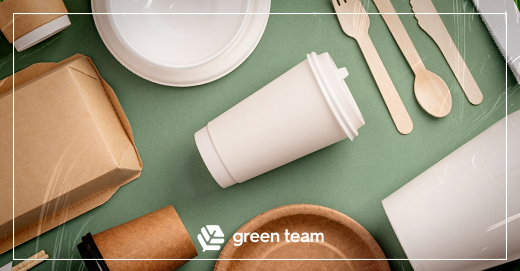![]()
Industries are evolving. Faced with the need for collective efforts to curb pollution, more and more companies are reconsidering their processes and opting for more sustainable materials in their production. In this journey, it’s important to understand a couple of features that, when combined, make it possible for a product not to pollute.
At Green Team®, we specialize in manufacturing biodegradable and compostable materials that replace various types of traditional plastic, with the advantage that they do not pollute. We consider ourselves an EcoCompatible industry—want to know why? Read on.
Step 1: Biodegradable materials in the short term.
Biodegradation is a natural process where various environmental microorganisms break down the components of a substance or material into simpler, non-harmful substances. All materials of natural origin (vegetal, animal, or mineral), like most plastics, have the capacity to degrade. The issue is that the most commonly used plastics in the world take many years to do so, some even more than a thousand years.
Another drawback is that not all environments are conducive to plastic degradation. Therefore, if there’s insufficient oxygenation or sunlight, as often happens in landfills, their biodegradation process will be even slower. Although the term “biodegradable” has become popular in recent years to signify that a product is “ecofriendly,” don’t be deceived! The label may easily state that a product is biodegradable without revealing how long its biodegradation will take or the environmental impact it will generate during that time.
At Green Team®, we produce 100% biodegradable materials that will naturally reintegrate into the soil, without harming it and in a short period. And if you’re wondering what happens when they are not discarded on the ground, no need to worry! Our materials will also biodegrade into their natural elements if they end up in fresh or saltwater.
Compostability: Another essential quality.
Materials qualify as compostable if, during their biodegradation by natural organisms and environmental factors, they break down into simple elements, producing biomass that returns in the form of nutrients to the soil, much like what happens in forests. Moreover, composting is a process that accelerates material biodegradation, thanks to controlled conditions of temperature, humidity, and the type of micro or macroorganisms involved in the decomposition.
According to the EN-13432 standard of the European Union that supports our biodegradable materials, for packaging, packaging, and other products to be considered compostable, they must degrade at least 90% of their total mass within a maximum of 6 months and be fragmented into portions less than 2mm within 12 weeks. Additionally, they should not leave any toxic residue during this decomposition.
All Green Team® biodegradable materials are also compostable, ensuring their sustainability as they return to the soil as nutrients. The best part is that they don’t require industrial compost; they can be treated in home composters, from a pot to a garden.
Our EcoCompatible Proposal.
Unlike many bioplastics currently presented as a “green” alternative, at Green Team®, we have ensured that our substitutes for traditional plastics do not harm the planet, regardless of the environment and conditions in which they are discarded.
We have chosen the term EcoCompatible to distinguish ourselves from other supposedly sustainable options that do not consider all the details and only focus on Greenwashing. If you’re interested in taking action, we present these biodegradable materials that Green Team manufactures, which do not pollute.
Our biodegradable materials are made from natural and renewable ingredients that can decompose in a very short time and in any environment. Therefore, whether they end up in a garden, the sea, or neglected landfills, they will degrade in less than 1 year, leaving no polluting residue.
Certified as compostable, in addition to not polluting or leaving toxic residues or microplastics, you can rest assured that their biodegradation contributes nutrients to the soil.
Now that you know the difference between biodegradation and compostability, you can be confident that our materials are truly EcoCompatible. You can have peace of mind knowing that, in addition to not producing environmental pollution, they also meet all the requirements to be useful and adapt to a wide variety of industries.
Follow us on: Facebook, Instagram, Linkedin, y YouTube

